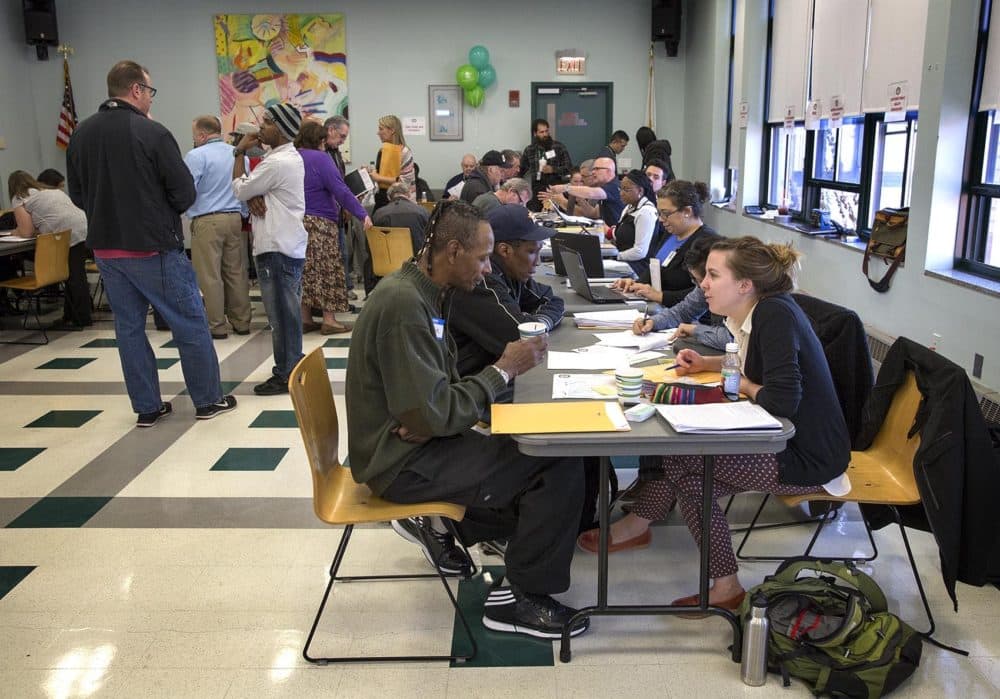Advertisement
Concerns Grow Among Mass. Affordable Housing Agencies Amid Shutdown
Resume
Now about four weeks into the government shutdown, the federal agency that distributes housing dollars is closed for business. That's causing some people in Massachusetts' affordable housing sector to develop contingency plans.
In Massachusetts, 56 housing developments have contracts with the U.S. Department of Housing and Urban Development that expired or will expire between December and February, according to the National Low Income Housing Coalition, a Washington, D.C., nonprofit. The coalition has called on congressional leaders to restore housing dollars for everyone from the elderly to the quarter million rural families who count on subsidies.
The group’s Diane Yentel said funding from HUD is expected to continue to flow to other developments through February — but with no end in sight for the shutdown, nearly all of HUD programs could be in jeopardy.
A major one is Section 8 vouchers for low-income tenants.
"The cliff really comes in early March,” Yentel said. "And if this shutdown were to go that long we'd have a severe crisis on our hands because we would have over 2 million voucher holders who wouldn't be able to pay the rent to their landlords who would be expecting that money to be coming through."
Earlier this month, HUD sent letters to hundreds of landlords asking them not to evict tenants due to funding problems tied to the shutdown. A spokesman for the agency told WBUR evictions have never taken place as a result of a shutdown, and officials said they hope this time is no different.
The agency also asked landlords to use reserves to fund any shortfalls that result from the shutdown.
In Massachusetts, HUD supports housing for 350,000 people, the bulk of them through Section 8 Housing Choice vouchers and project-based vouchers.
The largest of the four dozen or so affordable housing developments with expiring contracts in Massachusetts is Tai Tung Village in Chinatown.
Ed Cafasso, a spokesman for the development’s owner WinnCompanies, said WinnCompanies is prepared to dip into reserves to cover any disruption to funding for its Section 8 tenants.
“If we go to February it's likely that we're going to have to start covering some of these payments ourselves … until such time as the shutdown ends,” he said.
Many in the affordable housing sector assume Congress and the White House will get the government back up and running before any major damage is done. A further assumption held by many is that Congress will reimburse developers like WinnCompanies for money spent in place of HUD dollars — that’s what has happened after previous shutdowns.
“It does cause some anxiety, but at the same time we've been in business for 48 years,” Cafasso said. "So we've had shutdowns, we've experienced shutdowns before."
The closure of HUD operations isn’t just about money. Without being able to receive documents or authorizations from HUD, deals to build or purchase affordable units could be gummed up until the government reopens.
“So this is mission central only,” said HUD spokesman Jereon Brown. “Out of the 7,500 employees that we have nationwide, we have approximately 350 that are working on a full-time basis." That means essential services only.
It’s too early to say whether housing production will be stalled by the shutdown, said Chrystal Kornegay, executive director of MassHousing, the quasi-public agency that serves as the state’s affordable housing bank.
“The first thing we’ve got to make sure is that money is flowing to properties, so that we’re not endangering any existing tenants — never mind money flowing so that we can do more production,” she said.
Not everybody has the same level of confidence that the shutdown will be resolved quickly enough to avert bigger problems. This is now the longest shutdown in American history, and President Trump has reportedly said he’s willing to let it go on for months, even years.
“All these pieces I think are very worrisome if this goes on much longer,” said Lyndia Downie, executive director of Pine Street Inn, which runs the area’s largest homeless shelter, as well as 850 units of affordable housing. Every one of those units depends on HUD funding.
"When we all thought [the shutdown would last] a week or two, [we thought], ‘You can figure that out. Of course you can. A couple weeks? Not a big deal.' I think if it's many months though, it has implications across the board," Downie said, "and I don't think we know what they are yet."
Once it became clear that this shutdown was different, Downie ordered a review of Pine Street's liquidity and its exposure to federal funding. The nonprofit receives $10.7 million from HUD, about 20 percent of the its annual budget.
If the shutdown continues through the end of September, all of Pine Street's HUD contracts will have expired, resulting in a shortfall of $870,000 per month.
In addition to using reserves to pay the bills, Pine Street will ask to postpone payments on their bills.
As much as she’s concerned about funding to her organization, Downie is more worried about how the shutdown will affect the people she serves: people struggling with mental illnesses, poverty or the elderly. For example, the government has only funded its food stamps program through February.
"When you live on the margins like this, anything that changes the margins, anything can be pretty catastrophic," she said.
At the end of this month, the first HUD contract set to expire for Pine Street is a grant to support services for people who are chronically homeless.
This segment aired on January 16, 2019.
